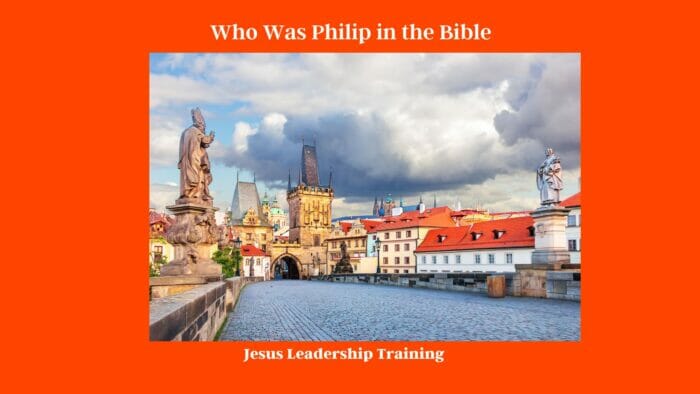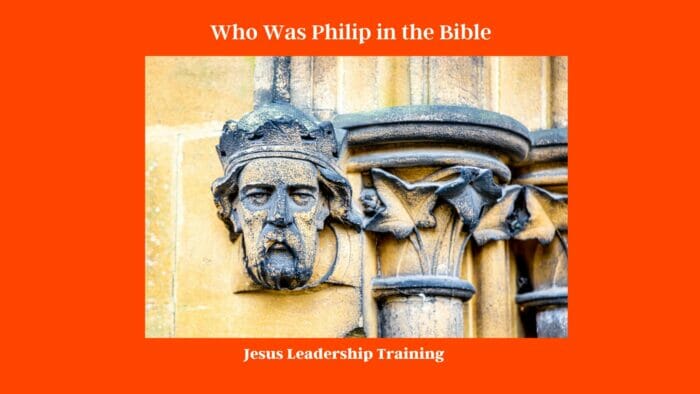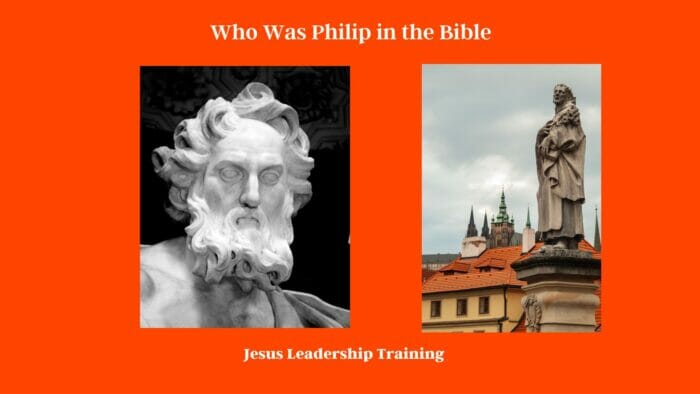Welcome to our deep dive into the character of Philip in the Bible. Philip is a figure who weaves in and out of the New Testament narrative, popping up at critical moments and then fading into the background. Yet his contributions are profound, underscoring key themes of evangelism, obedience, and the inclusive nature of Christ’s message. But who was Philip in the Bible? Let’s set off on our exploration.
Table of Contents
Who Was Philip in the Bible?
In the biblical account, two main figures bear the name Philip. The first is Philip the Apostle, one of the original 12 disciples of Jesus Christ. The second is Philip the Evangelist, a prominent figure in the book of Acts. Let’s take a look at both individuals to fully appreciate the breadth of Philip’s influence.
The Bible, especially the New Testament, provides some facts about Philip the Apostle, while other aspects of his life are known from early Christian tradition. The following table summarizes key aspects of Philip’s life according to both sources:
| Fact | Source | Description |
|---|---|---|
| Called by Jesus | Bible (John 1:43) | Philip was specifically called by Jesus to follow Him. He immediately accepted this call, showcasing his faith and obedience. |
| From Bethsaida | Bible (John 1:44) | Like Andrew and Peter, Philip was from the town of Bethsaida in Galilee, indicating his possible ties with fishing or other common professions of the time. |
| Introduced Nathanael to Jesus | Bible (John 1:45-46) | Philip brought Nathanael (also known as Bartholomew) to Jesus, displaying his commitment to sharing the good news about Jesus. |
| Jesus tested Philip | Bible (John 6:5-7) | Before the miraculous feeding of the 5,000, Jesus tested Philip by asking him where they could buy bread to feed the crowd. This incident shows Philip’s practical concern and reveals the limit of his understanding at that time. |
| Asked Jesus to show them the Father | Bible (John 14:8-9) | During the Last Supper, Philip asked Jesus to show them the Father, leading to Jesus’s teaching that anyone who has seen Him has seen the Father. This shows Philip’s desire for deeper understanding and his role in prompting significant teachings of Jesus. |
| Preached the Gospel in Asia Minor | Tradition | After Jesus’s ascension, tradition states that Philip preached the Gospel in Asia Minor, often associated with the city of Hierapolis in present-day Turkey. |
| Martyrdom | Tradition | Early Christian tradition holds that Philip was martyred for his faith, often stated as being crucified upside-down or stoned to death in Hierapolis. |

Remember that while the Bible provides certain details about Philip’s life, much of what we know comes from early Christian tradition, which may vary and is not universally accepted.
Unraveling the Mystery: How Many Apostles Did Jesus Have | Jesus | Disciples | Christ
Philip the Apostle: An Original Disciple
Joining the Fold
Philip the Apostle was from Bethsaida in Galilee, just like Andrew and Peter. The Bible tells us he was one of the first disciples Jesus called. How did Philip respond? He wasted no time and immediately followed Jesus, illustrating early on his obedience and faith.
Witness to Miracles
Philip was present for many of Jesus’s miracles, including the feeding of the 5,000. His pragmatic approach is evident when he points out the logistical issues of feeding such a crowd, demonstrating his practical mindset.
Philip the Evangelist: A Voice in the Wilderness
Called to Serve
Philip the Evangelist, also known as Philip the Deacon, is introduced in Acts. He was one of the seven men chosen to assist the apostles in their ministry. His responsibilities primarily centered on taking care of the poor and serving tables, essential work in the early church.
The Samaria and Ethiopian Eunuch Encounters
Philip the Evangelist later journeyed to Samaria, where he preached the gospel. Here, he performs miracles, showing his spiritual authority. His encounter with the Ethiopian eunuch is an especially touching example of his dedication to spreading the message of Jesus.

Significance of Philip in the Bible
Philip the Apostle’s Contribution
Philip’s role in the New Testament shouldn’t be underestimated. He symbolizes faith, obedience, and a practical approach to discipleship. Is there something we can learn from him?
Philip the Evangelist’s Impact
Philip the Evangelist is an example of how we should embrace our roles, whether they are considered high or low in the eyes of society. His devotion to service and evangelism, particularly among non-Jews, highlights the inclusive nature of the gospel.
Lessons from Philip in the Bible

The Faith of Philip the Apostle
Philip the Apostle teaches us the importance of immediate obedience when Jesus calls us. How can we apply this lesson in our lives?
The Service of Philip the Evangelist
Philip the Evangelist serves as a reminder that every role in the kingdom of God is significant. His example challenges us to serve with dedication and humility, just as he did.
The life of Philip the Apostle, as recorded in the New Testament and early Christian tradition, offers a number of spiritual lessons applicable for believers today. Here is a table illustrating some of these lessons:
| Lesson | Description |
|---|---|
| Obedience to Christ’s Call | Philip’s immediate response to Jesus’s call to follow him teaches the value of obedience and willingness to leave everything behind for the sake of Christ. |
| Evangelism | Philip introduced Nathanael to Jesus, demonstrating the importance of sharing the good news about Jesus with others, regardless of their initial skepticism or doubts. |
| Trust in Jesus’ Providence | When Jesus tested Philip about how to feed the 5,000, it underscored the lesson of trusting in Jesus’ providence, even when human reasoning can’t see a way forward. |
| Desire for Spiritual Understanding | Philip’s request to Jesus to show them the Father indicates a deep desire for spiritual understanding, a trait every believer should cultivate. |
| Humility and Persistence in Faith | Even though Philip, like the other disciples, didn’t always fully understand Jesus’ teachings, he remained dedicated and humble, teaching us to be persistent in our faith journey, even when we don’t have all the answers. |
| Courage in the Face of Persecution | Tradition holds that Philip preached the Gospel in the face of opposition and was eventually martyred. His courage and commitment to spreading the Gospel, even in the face of death, serves as a powerful lesson for all believers. |
Philip in Modern Day Interpretation
How Churches Today See Philip
Different Christian denominations regard Philip in varying ways. Some celebrate him as a saint, while others focus more on his contributions to the church. What does your church say about Philip?
Influence on Christian Art and Literature
Philip’s impact stretches beyond biblical texts. You’ll find his influence in Christian art, literature, and other forms of expression. How does our culture reflect his influence today?
The Bible is filled with stories of men and women of faith who have shaped our understanding of God and the world. One of the most important figures in the Bible is the Apostle Philip. His story is filled with examples of faith, courage, and love. In this blog, we will explore who Philip was and the impact he had on the early Church.
Facts about the Apostle Philip
He was one of the Twelve
Philip was one of the Twelve Apostles chosen by Jesus to be his disciples. He was a Galilean and a native of Bethsaida, the hometown of Peter and Andrew. Philip was a close friend of Andrew, and he was present at many of the events in Jesus’ ministry.
He came from Bethsaida
Bethsaida was a small fishing village on the northern shore of the Sea of Galilee. This was the home of several of Jesus’ disciples, including Andrew and Peter. Philip was not from the same family as the other two, but he was a native of Bethsaida.
Bethsaida, a town mentioned several times in the New Testament, holds several significant facts in both biblical and archaeological perspectives. Here’s a table providing an overview of the important information about this ancient settlement:
| Fact | Description |
|---|---|
| Biblical References | Bethsaida is mentioned in the New Testament, primarily in the Gospels of Matthew, Mark, Luke, and John. It’s identified as the birthplace of Philip, Andrew, and Peter. |
| Miracles of Jesus | Bethsaida is recognized for the miracles Jesus performed there. These include the healing of a blind man and the feeding of the five thousand. |
| Geographical Location | Bethsaida is believed to have been located on the northeastern shore of the Sea of Galilee, though its exact location has been a matter of debate among scholars. |
| Jesus’ Rebuke | Despite the miracles performed there, Jesus pronounced a woe on Bethsaida for its lack of repentance. This highlights the town’s resistance to the teachings of Jesus, despite witnessing His miracles. |
| Archaeological Discoveries | Archaeological expeditions have unearthed a city that is believed to be Bethsaida. Findings include a city gate from the time of David and Solomon, fisherman’s house, and Roman bathhouse, adding historical context to the biblical narrative. |
| Historical Significance | In the first century AD, the city was known as “Julias,” named after Julia, the mother of Roman Emperor Tiberius. It was a fishing village and a producer of salted fish, a major industry at that time. |
He was not Philip the Evangelist
Philip the Evangelist is mentioned several times in the New Testament, but he is not the same person as the Apostle Philip. He was an evangelist or preacher in the early Church, and he was likely from Caesarea.
He may have been a missionary
Philip may have been a missionary, although there is no direct evidence of this. He is mentioned in Acts 8:5 as being in Samaria. He may have been sent there by the Church as part of an outreach mission.
Here is a table that outlines where Philip worked in his missionary journey and traditional accounts regarding his death:
| Aspect | Description |
|---|---|
| Early Ministry | In the Bible, Philip’s early ministry was largely in Jerusalem and Samaria. After Stephen’s death, Philip, like other disciples, scattered from Jerusalem and preached the Word in various regions. In Samaria, Philip performed miracles, drove out impure spirits, and healed the lame, which resulted in great joy in the city (Acts 8:4-8). |
| Ministry in Gaza | According to Acts 8:26-40, Philip was led by an angel to a road from Jerusalem to Gaza. Here, he encountered an Ethiopian eunuch, a high-ranking official in charge of all the treasury of Candace, queen of the Ethiopians. Philip shared the Gospel with the eunuch, explained the prophecy of Isaiah, and baptized him. |
| Ministry in Caesarea | In Acts 21:8, Philip was mentioned as residing in Caesarea, and it was here that the apostle Paul visited him. This indicates that he may have had a significant ministry in this region. |
| Later Ministry and Death | Extra-biblical sources, like the writings of the early Church Fathers, suggest that Philip preached in Phrygia, in present-day Turkey, and died in Hierapolis. The cause of death is traditionally said to be martyrdom, although the exact circumstances vary among different sources. Some accounts say he was crucified upside down, while others claim he was stoned to death. |
| Place of Burial | The burial place of Philip is traditionally believed to be in the Martyrium of St. Philip in Hierapolis, although there is no definitive archaeological evidence to support this. |
Please note that information about Philip’s later ministry and death is not found in the New Testament, and it’s based largely on tradition and writings of the early Church Fathers.
Jesus calls Philip and Nathanael (John 1:43–51)
The first mention of Philip in the Bible is when Jesus calls him and Nathanael to follow him. Philip immediately goes and finds Nathanael and tells him about Jesus.
Jesus Feeds the 5,000 (John 6:1–15)
Philip was present at the feeding of the 5,000. He is the one who tells Jesus that it would take 200 denarii to buy enough food to feed the crowd.
Philip refers some Greeks to Jesus (John 12:20–36)
Later in the Gospel of John, Philip is approached by some Greeks who want to meet Jesus. Philip tells Andrew, and the two of them go to Jesus to tell him about the request.
Jesus the Way to the Father
Philip is present when Jesus tells the disciples that he is “the way, the truth, and the life.” He is also present when Jesus says that he is in the Father and the Father is in him. (John 14:5–14)
The Cost of Following Jesus
Philip is also present when Jesus tells the disciples that they must take up their cross and follow him. He is also present when Jesus tells the rich young man that he must sell all that he has and follow him.(Luke 9:57–62, Matthew 8:18–22)
How did Philip the Apostle die?
There is no record of how Philip the Apostle died. However, it is believed that he died a martyr’s death. According to some traditions, he was crucified in Hierapolis in modern-day Turkey.
Philip the Apostle is an important figure in the Bible. He was one of the Twelve chosen by Jesus to be his disciples and he was present at many of the key events in Jesus’ ministry. He was also a possible missionary and may have died a martyr’s death. Philip’s story is an example of faith, courage, and love that all Christians should strive to emulate.
Meaning of the Name Philip
The etymology of the Biblical Name Philip is an interesting one. It is a name that has been used in the Bible for centuries, and it has a long and varied history.
Origin
The origin of the name Philip is uncertain. Some say that it is of Hebrew origin, while others think it has its roots in Greek. It is likely that the name has been passed down through generations, and that it has been influenced by various languages and cultures.
Hebrew
In Hebrew, the name Philip is derived from the Hebrew word for “horseman” or “friend of horses”. The name may have been chosen because of the association with horses, which were important symbols in the ancient world. This could be seen in the Bible, where Philip is one of the disciples of Jesus.
Greek
In Greek, the name Philip is derived from the Greek word for “lover of horses”. This could be in reference to the same symbolism mentioned above, or it could be simply that the person liked horses and was named after them.
Aramaic
In Aramaic, the name Philip is derived from the word for “lion”. This could be an indication that the person had a strong presence, like a lion.
Latin
In Latin, the name Philip is derived from the word for “lover” or “beloved”. This could be an indication of the strong bond and affection between the person and those they were close to.
No matter what its origin, the Biblical name Philip is an interesting one. It has been used in the Bible for centuries and has a long and varied history. Its meaning has changed over the centuries, but its original meaning of “horseman” or “friend of horses” is still seen today.
Table of Names that come from the Biblical name of Philip
Here is a table listing names that derive from the biblical name “Philip”:
| Language | Male | Female |
|---|---|---|
| English | Philip, Phillip, Phil, Pip | Philippa, Pippa, Philomena |
| Greek | Philippos, Filippos | Philippa, Filippa |
| Italian | Filippo | Filippa, Pippa |
| Spanish | Felipe | Felipa, Pippa |
| Portuguese | Filipe | Filipa |
| French | Philippe | Philippa, Philomène |
| German | Philipp | Philippa |
| Dutch | Flip, Filip, Philip | Filippa, Pippa |
| Danish | Filip | Filippa |
| Swedish | Filip | Filippa |
| Norwegian | Filip | Filippa |
| Russian | Filipp (Филипп) | Filippa (Филиппа) |
| Polish | Filip | Filippa |
| Czech | Filip | Filipa |
| Romanian | Filip | Filippa |
Note: The variations in names reflect both linguistic and cultural differences, and some of these versions might be less common or even rare.
Frequently Asked Questions
1. Who was Philip in the Bible?
Philip is a name borne by two key figures in the New Testament: Philip the Apostle, one of the original 12 disciples, and Philip the Evangelist, a deacon in the early church and an influential figure in the book of Acts.
2. What did Philip the Apostle do?
Philip the Apostle was a follower of Jesus who was present for many key events and miracles. He displayed a pragmatic, yet obedient faith.
3. What is Philip the Evangelist known for?
Philip the Evangelist is celebrated for his role as a deacon serving the poor and for his work evangelizing in Samaria and to an Ethiopian eunuch.
4. Why are the two Philips significant?
Both Philips are vital figures in the New Testament. They demonstrate different facets of faith and service, providing valuable lessons for modern Christians.
5. How are the two Philips represented in the church today?
Their representation varies across different Christian denominations. Some honor them as saints, while others emphasize their contributions to the early church and the spread of the gospel.
6. Where else do we see the influence of Philip in the Bible?
Philip’s influence is visible in Christian art, literature, and other forms of cultural expression.
Final Thoughts: Who was Philip in the Bible
So, who was Philip in the Bible? Whether we’re discussing Philip the Apostle or Philip the Evangelist, both figures made significant contributions to the early Christian church. Their roles—though different—highlight the range of ways one can serve and follow Jesus. As we reflect on their stories, let’s strive to emulate their faith, obedience, and dedication to service.



